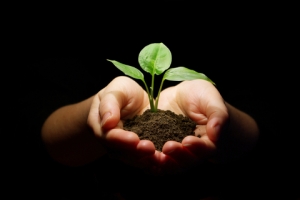by Kim Wilhelm and Bryan Jones of Sweet Corn Organic Nursery
 The soil test is at the heart of organic gardening. It all happens in the soil. If you have healthy soil, you will have healthy plants. There is nothing more important…and there is nothing more frustrating to a gardener than to spend time and money planting the garden of their dreams, and anticipating with excitement what will rise from the soil, only to be let down by the results.
The soil test is at the heart of organic gardening. It all happens in the soil. If you have healthy soil, you will have healthy plants. There is nothing more important…and there is nothing more frustrating to a gardener than to spend time and money planting the garden of their dreams, and anticipating with excitement what will rise from the soil, only to be let down by the results.
The reality is that different plants — whether they are vegetables, flowers or trees — thrive in different environments with different optimal levels of acidity, and different requirements for nitrogen, phosphorus and potash. A soil test will give you valuable information about how you should amend your soil to provide whatever it is that you are growing with the nutrients they need to thrive.
So, how do you go about doing a soil test? I’ve never found a cheap soil test kit that you can buy from a hardware store or garden center that works. If you have two different kits and take a test of the same area, I will bet money that you’ll get two different results. Truly, the best way to get an accurate reading of your soil is to have it professionally tested every two or three years.
The best way and the most economical way to do a soil test of your property is to do an average. If you’re only going to grow in a certain area, then only take a test of that area. The reason is when most houses are being built they remove top soil to build foundations, and if a basement is being dug they pile very low quality soil on top of top soil – which can give you a very different reading on a small site. If you do want to know about the soil of multiple areas of your property, the best way to tell if you have different types of soil is to look at the vegetation growing. If the plants are the same height and the same species, then one test should be fine. But if you notice a real difference, then gathers soil samples in the different areas and test as well.
Take a sample of soil from all four corners and two down the middle of the area you want tested. Make sure you remove the very top of the soil before you take the sample with a broom or flat shovel. A bird or rabbit might have left you a present and it will give you a false reading. Then mix the soil together and put a tablespoon or so in a ziploc bag to take to a professional to be tested. If you can’t find somebody locally to do it, we also offer a soil test service.









0 Comments